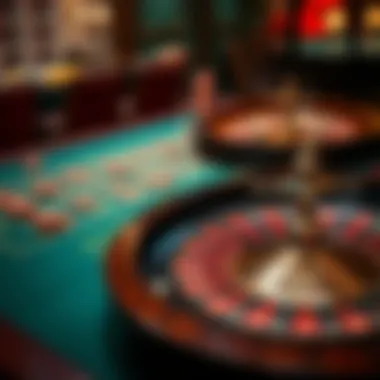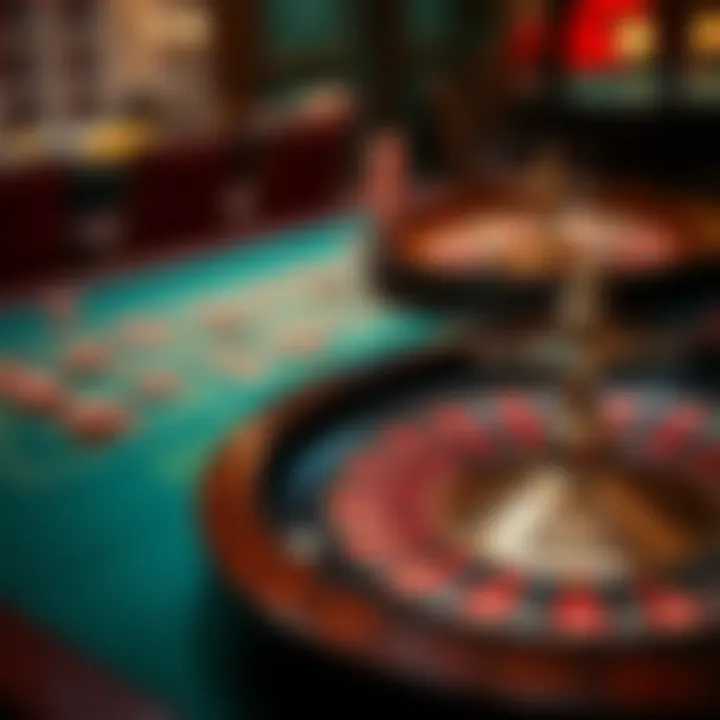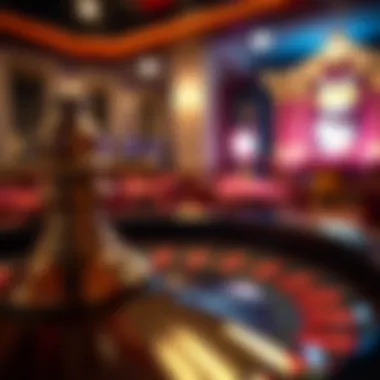Mastering Roulette Odds: Strategies for Success


Intro
Roulette, a classic game of chance, has captivated gamblers for centuries. Its spinning wheel, colored pockets, and the thrill of potential wins create an intoxicating atmosphere. However, understanding the odds associated with this game can make the difference between a fleeting experience and a fruitful endeavor.
One of the first steps in this journey is to grasp the various types of bets players can make. Each bet carries its own odds and house edge, impacting both the player’s potential for winning and the overall casino’s profit margin. Getting a handle on these elements is key to formulating effective strategies for play.
Moreover, players often fall into the trap of viewing roulette purely as a game of luck, overlooking the importance of strategic thinking. Managing risks, understanding the undercurrents of gambling psychology, and employing suitable betting techniques can drastically improve the overall experience. This article will delve into the strategies, insights, and key principles that govern successful roulette play.
As we explore each facet in detail, you'll develop a sharper perspective on how to navigate this enthralling realm. By honing your understanding of odds, risk management, and your own psychological framework, you’ll be better equipped to make informed decisions at the roulette table.
Understanding Roulette
When it comes to navigating the world of roulette, understanding the game is not just beneficial; it’s essential. Knowing the historical context, the layout of the table, and how different variants of the game function helps form a solid foundation for making informed betting decisions. Each aspect of roulette contributes to the odds and strategies that a player can utilize to enhance their experience and, potentially, their gains.
Historical Background
Roulette's origins trace back to 17th-century France, where it emerged as a favorite pastime among the French elite. The game's name, which literally means "little wheel" in French, reflects its configuration and serves as a gateway into its complex yet intriguing evolution through the ages. The game has seen its share of changes, including the introduction of rules and various betting styles, which have made it a staple in both physical and online casinos today.
Understanding this history not only provides context but allows players to appreciate the rich tapestry of traditions and influences that have shaped roulette into the thrilling game that it is now.
Game Structure
Table Layout
The table layout for roulette might seem overwhelming at first glance, but its design is meticulously crafted to enhance gameplay and betting strategies. Each table features a visual representation of the numbers, with options for both inside and outside bets. The inside betting area is where players place bets directly on numbers, while outside bets cover larger groups like colors or even/odd numbers. This clear structure directs players to focus on their strategies more effectively.
A noteworthy characteristic of the table layout is the arrangement of numbers. Traditionally, numbers 1 through 36 are arranged in a non-sequential order, which can be counterintuitive for beginners. However, this arrangement is pivotal because it plays into the game’s inherent unpredictability. For example, those who favor outside bets may find comfort in their lower house edge while also having a greater chance of a winning outcome--a common preference among seasoned players.
Wheel Design
The wheel design complements the table perfectly. Rotating in one direction, while a small ball spins in the opposite, creates an element of suspense with every turn. In European roulette, the wheel contains 37 slots numbered 0 to 36. The single zero is a key feature that limits the house edge compared to its American counterpart, which has an additional double zero slot, leading to a greater house advantage.
What sets the wheel apart is not just its numeration but also its balanced physics. The distribution of colors—18 red, 18 black, and one green—llows for a dynamic betting experience. Players often find themselves mystified with the outcomes of each spin, which can add an exciting layer of unpredictability to the game.
Different Variants
European Roulette
European roulette is the go-to for many players due to its favorable odds. With a house edge of only 2.7%, it tends to attract those who prefer a more strategically balanced game. The absence of the double zero makes all the difference, providing a broader array of winning bets for players. Its popularity has led to a widespread understanding of the game, making it more accessible for newcomers.
American Roulette
American roulette presents itself with a flashing double zero and this small feature results in a significant house edge of 5.26%. While many still relish the excitement of betting on American roulette because of its flashy image, it unfortunately tilts the odds unfavorably for players. The presence of both a single and a double zero adds layers of risk, which can be a disadvantage for those aiming to maximize their positions.
French Roulette
French roulette is often seen as the crème de la crème among the variants. It shares similarities with the European version but has additional rules, such as 'La Partage' and 'En Prison,' which can lower the house edge effectively to 1.35% for even-money bets. This variant embodies the elegance of French gaming culture, offering unique elements that appeal to players looking for an enriched gaming experience.


Exploring Odds in Roulette
Understanding the odds in roulette is crucial as it arms players with the knowledge to make informed decisions while gambling. Whether you're in a glitzy casino or playing online, comprehending these odds shapes your betting strategy and influences your overall experience. The reality is that roulette has a house edge, meaning that, statistically speaking, the casino always has a slight advantage. Yet, by familiarizing yourself with diverse bet types and their associated odds, players can navigate the game more effectively and enhance their chances of winning while limiting potential losses.
It's important to approach the game with a mindset that balances enjoyment and pragmatism. The intricacies of bets and probabilities will not only guide your gameplay but will also help you to set realistic expectations. Players who grasp the concepts of house edge and types of bets can better manage their bankrolls and gambling habits. Now, let’s dive deeper into these crucial elements.
House Edge Explained
The house edge in roulette can be likened to the cost of admission to a thrilling show—it's what keeps the lights on. In essence, the house edge varies between the different types of roulette games available. For instance, in European roulette, the house edge is 2.7%, while American roulette carries a heftier house edge of 5.26%, thanks to an extra zero on its wheel. The math may sound straightforward, but understanding these figures can significantly influence your approach.
The real issue isn't merely about how high the house edge is, but how you can adjust your strategies accordingly. This means that players interested in minimizing the impact of the house edge might prefer European roulette, which is statistically favorable. However, it’s essential to appreciate that the house edge is designed to ensure the casino's profit over time.
Types of Bets
A thorough understanding of the types of bets in roulette can be your secret weapon at the table. The two primary categories are Inside Bets and Outside Bets.
Inside Bets
Inside Bets involve wagering on specific numbers or a small group of numbers. There’s a certain thrill that accompanies these bets, as they generate a higher payout compared to other bet types. Players can stake on single numbers, pairs, or small clusters, making the odds more difficult yet potentially more rewarding.
For instance, a bet on a single number pays 35 to 1, but naturally, the risk is that the probability of winning is much lower. In essence, Inside Bets can be appealing due to their allure of big wins, but they also bear a higher risk. This is important to keep in mind if your goal aligns with maximizing short-term gains over long-term strategy.
Outside Bets
Outside Bets offer a different flavor, often involving larger groups of numbers. They include bets on colors like red or black, even or odd, or higher or lower numbers. Although the payout for these bets is considerably less, typically at 1 to 1 for color bets, they present a greater probability of winning. Essentially, they are more forgiving to the bank account, covering broader aspects of the wheel.
The beauty of Outside Bets is their ability to provide a cushion for your bankroll, allowing players to enjoy the game over a more extended period. They cater to those who prefer a slower, steadier pace rather than a high-risk route. In the context of this article, understanding this balance between risk and reward is pivotal.
Probability of Winning
When it comes to roulette, probability isn't just dry numbers on a page; it’s the pulse of the game. Each bet type has its own set of odds and corresponding probabilities, which are essential in assessing your likelihood of winning. For example, betting on red offers nearly a 50% chance of hitting, factoring in the zeros. On the other hand, a straightforward bet on a single number sits at a mere 2.63% in European roulette.
It's also worth noting that different betting strategies might influence your perception of these odds. Some gamblers might fall into the trap of chasing losses without realizing that the odds will remain constant regardless of previous spins. Therefore, arming yourself with the right understanding of probabilities can significantly improve not only your gameplay but also your emotional detachment from winning or losing.
Maximizing Your Odds
Maximizing your odds at the roulette table isn’t merely about chance; it�’s about weaving tactics into your play. Understanding this section empowers players to not just accept the odds laid before them, but to take an active role in shaping their experiences. Every decision from your betting strategy to recognizing when it’s time to leave contributes to either elevating your game or diminishing your funds. It’s a dance between strategy and emotional control, where every movement can lead you either to triumph or disappointment.
Betting Strategies
Martingale Strategy
The Martingale Strategy hinges on the principle of doubling down after a loss. Its key characteristic is simplicity: if you lose, you bet double on the next spin to recover both the loss and gain a profit equal to your original bet. It's a popular choice due to its straightforward and intuitive nature. Players often see it as an immediate path to recoup losses, aligning perfectly with our goal of maximizing odds.
However, one must tread lightly. The unique feature of this strategy is its reliance on having a substantial bankroll, as a string of bad luck could lead to exorbitant bets. Yes, the potential for recovery exists, but so does the risk of hitting table limits or exhausting funds. In essence, while the Martingale can be a tempting siren song for those who love high stakes, it is crucial to assess your financial limits closely.
Fibonacci Strategy
Unlike the Martingale, the Fibonacci Strategy is more about gradual progress. This method is rooted in a number sequence where each bet is the sum of the two previous bets. The key characteristic here lies in its strategic pacing. Rather than heavy losses from doubling bets, this approach spreads risk and emphasizes a slow recovery.


Why is it beneficial? Because it allows players to recover losses with incremental bets, potentially prolonging a playing session. The unique feature lies in its less abrupt increases in bet sizes, cushioning players against deep financial pits. Yet, it’s not without pitfalls. Miscalculating your sequence can lead to extended losses, and understanding the Fibonacci numbers becomes crucial.
Flat Betting
Flat Betting is often regarded as the most conservative strategy. With this approach, you place the same wager amount for every spin of the wheel, resisting the urge to increase stakes based on wins or losses. Its key characteristic is the preservation of your bankroll, making it a prudent choice for those aiming to prolong their gameplay without risking large sums in a short time.
The standout advantage in Flat Betting is the stability it offers. This method shields players from significant losses, allowing for an extended experience at the table while avoiding the emotional highs and lows often associated with fluctuating bet sizes. Some might find this method a bit dull, as it lacks the thrill of chasing big wins, but it stands as a solid strategy for maintaining longer play sessions.
When to Walk Away
Knowing when to gracefully exit the game is just as critical as understanding your betting strategy. The ability to recognize the right moment to call it quits can safeguard your bankroll and preserve your experience. It requires not just discipline, but a keen sense of self-awareness and emotional intelligence. Always remember: in the game of roulette, the wheel will keep spinning, but your funds won’t last forever unless you play smart.
"The best bet you can place is the one that recognizes you’ve had enough!"
Psychology of Gambling
Gambling, particularly in games like roulette, is not just a test of chance but also a fascinating exploration of the human mind. Understanding the psychology of gambling can play a crucial role in influencing your play style, risk appetite, and overall enjoyment of the game. With emotions running high and money on the line, the way players process wins and losses can significantly impact their decision-making. By looking into key psychological aspects, we can better grasp the behaviors and strategies that define successful and responsible gambling.
Emotional Resilience
One of the pillars of successful gambling is emotional resilience. Staying calm amidst the highs and lows of a roulette game can make a world of difference. Gambers prone to emotional responses may chase losses, betting aggressively in hopes of recouping what they’ve lost. This can lead to a spiral that not only affects financial health but also emotional well-being.
When players cultivate emotional resilience, they better manage their reactions. Instead of spiraling into despair after a losing round, emotionally resilient gamblers recognize that losses are part of the game. They adopt a longer-term perspective, viewing each session as a chapter in a bigger story instead of a one-off event. This not only eases the pressure during play but also allows for a more calculated approach to betting.
"The mind is a powerful tool; learn to use it wisely at the roulette table."
Strategies to build emotional resilience can include:
- Mindfulness Techniques: Practicing mindfulness can help maintain focus and calm.
- Set Realistic Goals: Know what you hope to achieve and manage your expectations accordingly.
- Take Breaks: Stepping away can clear your head and allow for more rational decision-making.
Managing Expectations
Managing expectations is another critical aspect leading to more enjoyable and responsible gambling. Players often approach roulette with a mix of excitement and anticipation, but those who have unrealistic expectations may find themselves disappointed. The thrill of the game can cloud judgment, leading to overestimation of winning chances, especially among novice players who might believe they can outsmart the house.
Realistic expectations offer a framework within which players can enjoy the game without unnecessary pressure. Understanding that roulette, while exciting, is inherently risky can mean a smoother ride through wins and losses.
To help in managing expectations, consider these tips:
- Educate Yourself: Understanding odds and house edge can provide clarity on what to expect.
- Set a Budget: Decide on a limit before playing and stick to it. It’s important to have a clear boundary that aids in realizing when to step back.
- Celebrate Small Wins: Acknowledging smaller victories can keep morale high and reduce the weight of heavier losses.
Responsible Gambling Practices
Responsible gambling is a cornerstone of enjoying games like roulette. It ensures that the experience remains entertaining and avoids the pitfalls of addiction or financial harm. While the thrill of placing a bet and watching the wheel spin can be exhilarating, it’s essential to approach the game with a mindset focused on moderation and self-awareness. By incorporating responsible gambling practices, players can explore the full enjoyment of the roulette experience while minimizing risks.
One vital aspect of responsible gambling is setting limits. This means establishing a personal threshold for how much money and time you’re willing to invest in the game. It’s all too easy to lose track of both when the excitement of the game takes over. Setting pre-emptive boundaries can make a significant difference.
Setting Limits
Setting limits involves not just deciding on a budget but also deciding how long you will play. Think about it like this: if you’re heading to a casino, treat it as an outing with a specific cash allowance. This is akin to planning a night out with friends -- you wouldn’t just bring a blank check, would you? It’s vital to have a clear idea of when it’s time to step away from the table.


- Money Limits: Before you begin playing, decide on a specific amount that you are comfortable losing. This way, if the chips are down, you can still walk away without feeling as though you’ve jeopardized your financial security.
- Time Limits: Similarly, consider restricting your playtime. Set a timer; when it goes off, it’s a gentle reminder to reassess your choices. Don’t let the thrill of the game consume your evening.
Setting these types of limits can give you a clearer sense of control and allow for a more enjoyable experience.
Recognizing Problem Gambling
Recognizing problem gambling is another crucial aspect of responsible gambling. It’s important to be aware of the signs that indicate an unhealthy relationship with gambling.
- Signs of Problem Gambling: Some common indicators include:
- Increasing thoughts about gambling, even when you’re away from the casino.
- Feeling the need to gamble with more money to experience the same excitement.
- Using gambling as a way to escape stress or problems in life.
If you see these signs in yourself or someone you know, it may be time to reassess. It’s not just about losses at the table; it’s about the broader impact of gambling on one’s life.
"The first step towards responsible gambling is to understand where it can lead. Ignoring the signs won't make them disappear."
By being proactive and recognizing these warning signals, you can help yourself or others take the necessary steps to seek help. Resources are available, such as the National Council on Problem Gambling, which provides information and support.
Overall, embracing responsible gambling practices transforms the roulette experience from potentially risky behavior into an enriching entertainment activity. It's about knowing when to hold 'em and when to fold 'em.
Technological Advances in Roulette
The world of roulette has not only evolved through the ages in the physical sense but also transformed dramatically due to technological advancements. The integration of technology has reshaped how players engage with the game, offering experiences that were once dreams of casino-goers in years past. Understanding these changes can help inform your approach to betting strategies and potentially enhance your odds.
Live Dealer Roulette
Live Dealer Roulette brings the excitement of a physical casino straight to your living room. By utilizing high-definition streaming technology, players are able to interact with real dealers in real time, creating a more immersive gaming environment. This format helps bridge the gap between online and traditional roulette, allowing players to enjoy the thrill of placing bets while viewing the wheel spin in a manner that feels genuine.
- Real Human Interaction: Unlike standard RNG (random number generator) games, Live Dealer Roulette offers the human element. Players can engage with dealers through chat, adding a sense of camaraderie that enhances the experience.
- Multiple Camera Angles: Many platforms provide various camera angles, which allow players to watch the game unfold from different perspectives. This transparency can instill more trust in the game, as players feel they have a better vantage point of the action.
- Easy Access: Supported by various devices, whether smartphones or tablets, Live Dealer Roulette enables players to drop in and place bets from almost anywhere. Additionally, the social aspect of engaging with other players, even in a virtual space, adds another layer of enjoyment.
However, it is wise to remain aware of potential downsides, such as higher betting limits typically associated with live dealer games and the fact that the pace may be slower than automated games, potentially affecting betting patterns.
Online Roulette Variations
Online roulette has opened the door for several unique variations of the classic game. These adaptations often offer novel rules and betting structures and can be beneficial for increasing your odds if you know what you're looking for.
- European Roulette: This is a preferred option for many players as it only has one zero on the wheel. This structure leads to a lower house edge compared to the American version. The house edge here is around 2.7%, making it a favored choice among strategists.
- American Roulette: Slightly different, American Roulette includes both a zero and a double zero on the wheel. This adds an additional house edge of about 5.26%. Players looking for better odds often steer clear of this option unless they enjoy the added thrill of the double zero.
- French Roulette: A subtly elegant twist, French Roulette shares a similar structure to European Roulette but introduces the "La Partage" rule. This rule allows players to recover half their stake if the ball lands on zero, giving it an edge for savvy players trying to minimize loses.
- Mini Roulette: A simplified version, Mini Roulette only features numbers 1 through 12 plus a zero. Though it carries a higher house edge, it can be an enticing introduction for novice players or a quick diversion for seasoned gamblers.
These online variations allow players the chance to choose games that best align with their betting strategy and risk tolerance. Knowing which version suits your style can give you a distinct advantage in maximizing your playtime and minimizing your losses.
Understanding these technological advances not only enhances the experience of roulette but can significantly inform your choices at the table. Technology is reshaping how we approach games, giving rise to opportunities previously unimagined in the world of gambling.
Ending
When diving into the world of roulette, understanding the odds and how they work is crucial for every player, from novice gamblers to seasoned high rollers. This section wraps up various insights and strategies covered earlier in the article, tying together the intricate relationship between expectation and reality in gameplay.
Final Thoughts on Expectation vs. Reality
Players often step to the roulette wheel with dreams of hitting the jackpot, but the reality is often a far cry from those aspirations. The excitement can easily cloud judgment, leading to decisions that might not align with strategic gambling practices. It’s important to maintain a level head and be aware of several factors:
- Risk vs. Reward: Every bet has a unique risk level. For example, betting on a single number offers higher payouts but is much riskier than betting on red or black.
- House Edge Understanding: Knowing the house edge of various bet types equips players with the knowledge needed for informed decisions. European roulette generally has a lower edge compared to its American counterpart, making it an attractive option for maximizing potential returns.
- Expectations Realism: Players should set realistic expectations based on their bankroll and the odds. The thrill of gambling can lead to excessive optimism, which may cloud judgment in terms of betting patterns and overall strategy.
"A wise gambler does not chase losses but understands the importance of managing their bankroll within the limits of their expectations."
Staying grounded and aware of the odds will not only enhance the enjoyment of the game but also reduce the likelihood of unfavorable outcomes. Having clarity about expectations versus reality leads to better choices, which ultimately fosters a more rewarding roulette experience.















